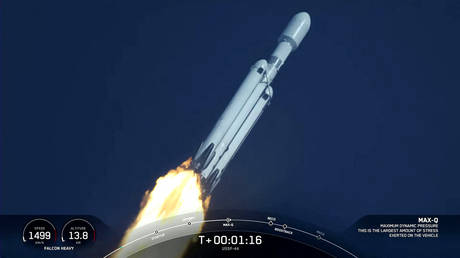Lightning strikes disrupt SpaceX launch plans
SpaceX has postponed the launch of its Falcon Heavy spacecraft, citing “unfavorable weather” after lightning struck the launchpad...

The postponement comes a week after the company’s Starship exploded just minutes after taking off
SpaceX has postponed the launch of its Falcon Heavy spacecraft after lightning struck the launchpad at the Kennedy Space Center in Florida. The American aerospace manufacturer said it would conduct another attempt on Friday evening.
In a message posted on Twitter on Thursday, SpaceX announced that “due to unfavorable weather, the team is standing down from tonight’s Falcon Heavy launch of @ViasatInc’s ViaSat-3 Americas mission.”
Due to unfavorable weather, the team is standing down from tonight’s Falcon Heavy launch of @ViasatInc’s ViaSat-3 Americas mission; backup opportunity is available tomorrow → https://t.co/ulZth3yuU5
— SpaceX (@SpaceX) April 27, 2023
Rain and strong winds were reported in eastern Florida during the day, with the US National Weather Service issuing a tornado warning.
Footage shared online showed multiple lightning bolts striking the launchpad and the surrounding area on Thursday.
After the scrub this evening we caught this electrifying clip from our new cam. @SpaceflightNow @NickyXPhoto @GregScott_photo #KSC #FalconHeavy #SpaceX pic.twitter.com/H9EOUqdgao
— LabPadre (@LabPadre) April 28, 2023
On board Falcon Heavy are several commercial satellites which it is expected to take into orbit.
Here's a video of that lightning strike at the Falcon Heavy's launch pad. pic.twitter.com/YOe9a9AwQW
— Spaceflight Now (@SpaceflightNow) April 28, 2023
The delay follows a failure last Thursday when SpaceX’s Starship exploded just minutes after liftoff. The spacecraft failed to separate from the booster rocket and began to fall from the sky.
The flight termination system, which is essentially a self-destruct mechanism, “was commanded on both the booster and ship,” SpaceX later explained.
READ MORE: Moon mission makes ‘hard landing’
The launch had been put off earlier that week and was almost aborted during the countdown.
“With a test like this, success comes from what we learn, and today’s test will help us improve Starship’s reliability as SpaceX seeks to make life multi-planetary,” the company said in a statement.






















